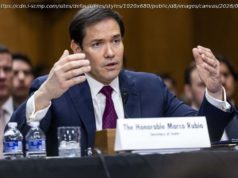Jon Ossoff, who was two points shy of a House victory in April, is courting millennials and minorities in a race to hold off Karen Handel and seize a Republican seat in a runoff.
ROSWELL, Ga. — Two percentage points.
That’s how close Jon Ossoff, a 30-year-old Democrat running for office for the first time, came to an upset victory in a conservative Georgia congressional district in an April election when he led a pack of 18 contenders with 48 percent of the vote.
How and whether he gets those two percentage points, roughly 3,700 votes, in a June 20 runoff have been at the heart of a political riddle that both sides have been trying to crack ever since.
And after energized Democrats ran two surprisingly competitive but eventually unsuccessful congressional races — in Kansas in April and in Montana this past week — what was once viewed as the longest of long shots here has turned into the most expensive House race in history. It is also one in which the pressure is on the Democrats to show they can turn their anti-Trump energies into a victory.
Democrats see a candidate within reach of a win that would be a powerful sign of Republican vulnerability as the Trump presidency unfolds. They are fervently seeking to enroll new voters, particularly minorities and young people; re-energize the voters Mr. Ossoff turned out in April; and bring into the fold the 0.9 percent of voters who supported other Democrats in that vote.
Republicans say the vote in April merely showed that even a Democrat like Mr. Ossoff, with extraordinary wind at his back, was bound to come up short in suburban Georgia, despite millions of dollars in out-of-state donations and thousands of volunteers turbocharged by their distaste for President Trump.
“Right now, they need every Democrat or independent they can find, ” said Kerwin Swint, chairman of the political science department at Kennesaw State University, near Atlanta, referring to the Democrats. “That includes minorities, young people, people interested in social justice, those sorts of things.”
The special election will fill a seat vacated by Tom Price, President Trump’s choice to head the Department of Health and Human Services. A Democrat has not held the seat since the Carter administration, and both sides expect an extraordinarily close finish between Mr. Ossoff and Karen Handel, his Republican opponent. On Wednesday in a downtown Atlanta high-rise, a small squad of get-out-the-vote workers employed by the New Georgia Project, a nonprofit that encourages minority political participation, was sitting around a conference table, stuffing fliers into plastic bags that would soon be hung on the doorknobs of minorities’ homes.
One worker asked a field director, Corbin Spencer, if they should bother to knock on the doors of homes that displayed a Handel sign. Most definitely, he replied.
“You’ d be surprised — there’s also husbands and wives who don’ t agree who they’ re going to vote on, ” Mr. Spencer said. “That happened a lot in the 2016 race. People were just divided.”
Ms. Handel, 55, the runner-up in April at just under 20 percent, has bulked up her base, attracting supporters of other Republican candidates who were defeated in the first round. She now faces the risk of losing some voters because of Mr. Trump’s troubles.
Ms. Handel, however, has the advantage of being a known quantity to many voters, having cemented her conservative bona fides as a Fulton County commissioner and Georgia secretary of state long before Mr. Trump’s rise to power.
The challenge for Mr. Ossoff, a documentary filmmaker and former congressional staff member, will be turning out his anti-Trump coalition in equal force a second time during summer vacation season — while Ms. Handel hammers him for living outside the district and accuses him of exaggerating his credentials and being a puppet of liberal national Democrats.
Mr. Ossoff’s supporters are dishing it out, as well, with one frequent ad accusing Ms. Handel of profligate spending while secretary of state. At the same time, they are trying to change the basic math of the race by reaching out to millennials and to minorities, who are altering the flavor of what a generation ago was a classic swath of deeply conservative, white-flight suburbia.
Mr. Ossoff may receive some help from two recent developments that expanded access to the polls: the May 11 expansion of early voting sites in three Ossoff-friendly areas of DeKalb County, and a May 4 injunction by a federal judge that extended the voter registration period.
The expansion of the registration period was a result of a suit brought by the Lawyers’ Committee for Civil Rights Under Law. While the Georgia secretary of state’s office reports that at least 5,500 new registrations have been processed in the expanded period, it is not yet clear if it will benefit Democrats or Republicans, as Georgia voters do not list party affiliation on their registrations.
On Tuesday night, Mr. Ossoff made an appearance at Hugo’s Oyster Bar in Roswell, about 20 minutes north of downtown Atlanta. The campaign billed the event as a “Millennial Meet and Greet, ” and it demonstrated the kind of enthusiasm Mr. Ossoff has generated among liberals here. Shortly after 8, a happy mob had pooled around him, necks craned as he snapped selfies with those who could get close enough. Young staff members handed out fliers for a coming “Rock Your Ossoff Concert.”
“I love him!” exclaimed Maya Underwood, 21, a predoctoral student at the University of Georgia who was back home in Roswell for summer break. “The way that he carries himself, his eye contact when he speaks to people.”
But Ms. Underwood, an African-American, also revealed her deeper reasons for supporting Mr. Ossoff. Since Mr. Trump’s election, she said, racial epithets had been hurled at her by white students. She said some residents in her dormitory, children of immigrants from Muslim nations, had been terrified by Mr. Trump’s anti-Muslim statements.
The campaign and other liberal groups are specifically canvassing minority neighborhoods, and the Democratic Congressional Campaign Committee announced Tuesday that it planned to spend $165,000 on radio and newspaper advertising targeting African-Americans as part of a $2 million investment in the runoff period.
The groups know there are minority voters out there to persuade: Census figures from 2015 show that the district is about 30 percent nonwhite. But minorities accounted for only about 17 percent of the April vote, according to an analysis provided by the New Georgia Project.
Nse Ufot, executive director of the New Georgia Project, said her teams were knocking on the doors of hundreds of minority residents’ homes per day, offering free Uber rides to the polls and information on early voting sites.
But their pitch, she said, is not overtly anti-Trump. Ms. Ufot argued that black people, so inured to the reality of discrimination, were just not as frightened as liberal whites by Mr.






